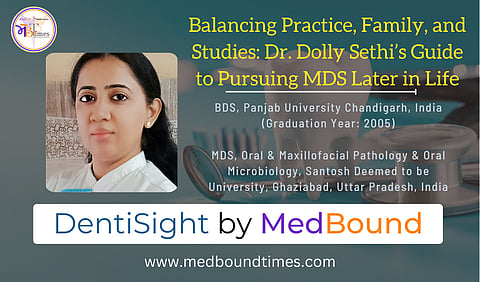Balancing Practice, Family, and Studies: Dr. Dolly Sethi’s Guide to Pursuing MDS Later in Life
Dr. Dolly Sethi is a senior oral pathologist with over 16 years of experience in the field of dentistry. Dr. Sethi completed her Bachelor of Dental Surgery (BDS) from Panjab University, Chandigarh (Graduation Year: 2005), and went on to pursue her Master of Dental Surgery (MDS) in Oral & Maxillofacial Pathology and Oral Microbiology from Santosh Deemed to be University, Ghaziabad, Uttar Pradesh. Currently practicing at Sethi Dental Clinic in Shakurbasti, Delhi, Dr. Sethi brings a wealth of knowledge and expertise to the world of oral pathology.
In this short interview with Dr. Shivani Bhandari of MedBound Times, Dr. Dolly Sethi discusses about pursuing MDS, practising dentistry at Delhi, time-management and much more .
Q1: What inspired you to pursue a postgraduate degree (MDS) after 10 years of completing your undergraduate studies?
My main motivation was the desire to deepen my expertise and knowledge. I had always felt there was more to explore in my field, and the decision to specialize was driven by my passion for learning and offering the best to my patients. I believe it’s never too late to follow your passion, no matter how many years have passed.
How did you adjust to being a student again after a decade in practice? Was it difficult to get back into the routine of studying?
Returning to student life was definitely challenging, but it was also refreshing. Initially, adapting to the academic routine, the intense reading, and regular assessments felt overwhelming. However, I embraced it as a new phase in my career. It was humbling to be a student again, and I feel I gained a fresh perspective.
Balancing a career, studies, and family life must have been a huge challenge. How did you manage it all?
It was certainly not easy. I relied heavily on planning and prioritizing my time. I had set study hours, clinic hours, and family time, and tried to stick to that schedule. My family was incredibly supportive, and they made sacrifices to help me achieve my goal. Without their support, it would have been impossible.
How did your children react to you going back to college? Did they understand the commitment involved?
My children were curious at first and then became very proud. They saw how hard I was working and were inspired to work harder themselves. It was a great lesson for them in perseverance and the importance of lifelong learning. It brought us closer, and we learned to support each other.
After establishing your practice in Delhi for over 15 years, how has pursuing a postgraduate degree changed your approach to patient care?
Returning to studies allowed me to update my knowledge with the latest advancements, which I’ve been able to implement in my practice. I’m more evidence-based in my approach, and I feel I can provide more comprehensive care to my patients. It’s been rewarding to see my patients benefit from my enhanced expertise.
What were some of the most challenging moments during your postgraduate studies, and how did you overcome them?
There were times when balancing everything seemed impossible, especially around exams or deadlines. Self-doubt crept in occasionally, but I kept reminding myself of my purpose. My family’s encouragement kept me going, and I learned to take one step at a time rather than getting overwhelmed.
Managing time effectively must have been critical. Could you share any practical time-management techniques that worked well for you?
Definitely! I used a detailed planner to organize my day, prioritizing tasks and setting specific goals for each week. I also set aside dedicated study hours and clinic hours, avoiding distractions during these times. Taking short breaks between tasks helped me stay focused and refreshed.
What advice would you give to other professionals who are considering further education later in their careers?
My advice would be to go for it! Pursuing education later in life is challenging, but incredibly rewarding. With determination and a supportive network, it’s possible to achieve your goals. Embrace the journey, and remember that learning is a lifelong process. It’s never too late to invest in yourself.


